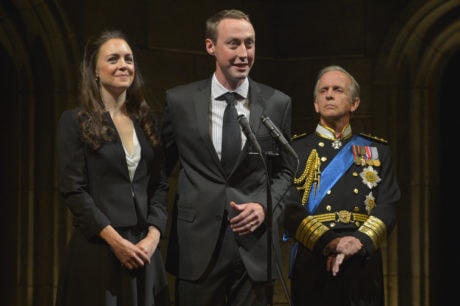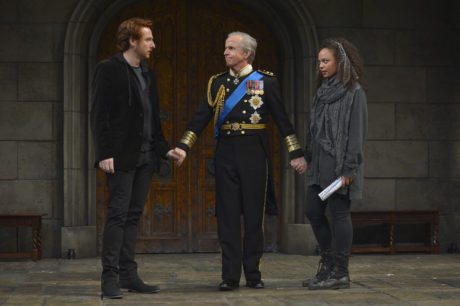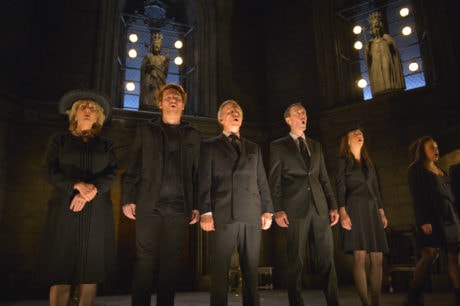The Ghost in the Machine
Mike Bartlett’s King Charles III premiered in 2014, at London’s Almeida Theatre. Both the original production and the Broadway production won numerous awards. This new version, presented by the Shakespeare Theatre Company, is a breathtaking achievement.
When the magical name of Diana is first invoked, a hush comes over the theatre as the ghost of the beautiful, tragic Princess haunts the stage. One remembers how billions watched her 1997 funeral, and billions cared. King Charles III begins with another funeral, that of Queen Elizabeth II, a shock heard around Great Britain and around the world. The play is speculative history, an imagined drama about what transpires when Charles ascends the throne. The production is like a magnificent crystal palace, one room more mysteriously unforgettable than the next.

The night belongs, as it should, to Robert Joy’s King Charles. In the crucial scene where he and Prince William (Christopher McLinden) argue, with the fate of the monarchy hanging in the balance, his performance achieves a power and poignancy which makes the conflict, in a way, universal. He could be any father clashing with any son. But of course, he is not. He is the King. And the succession, the key to so many of Shakespeare’s plays, will not be easy or pleasant.
Bartlett gives us the essence of each character, and something more; the inner glow of vivid artistic life. The language, mostly blank verse, is both Shakespearean and modern; Bartlett’s insight is that inside the family drama of the Windsors is a greater Shakespearean drama, with ghosts, crises of accession, and agonizing betrayals. Charles has decided not to sign a bill which places restrictions on the freedom of the press. The unintended consequences of this decision are the heart and soul of the play. But this assertion of power, as it often does, provokes the opposite; consternation and chaos.
Jeanne Paulsen’s Camilla is resolute, down-to-earth, and deeply in love with her King. Her steadfastness and devotion make her an attractive figure, despite their troubled history as a couple. The two seem to make each other happy, and she stands firm as Charles’s world crumbles around him.
McLinden’s William, intelligent, deeply sincere, and determined to do the right thing, holds his own as the pressures build. Allison Jean White, as Kate, a lovely and loving woman, has significant strategic talents and is not afraid to use them. She urges her husband to act:
You must go now and tell him what to do.
Because it is not him, or you, you risk,
By sitting her and doing nothing thus,
It is our children, and their children hence
And after that all generations royal…
Do look to you insisting that you defend
The Crown against this fool’s indulgence.
I say this not as future Queen but just
As British woman…
Prince Harry is the rebellious younger son, played with honesty and humor by Harry Smith. As he enters, confronted with an exhausted family, he breaks the tension with the classic line “I know there’s this thing, but I’m tired”. His friends Cootsy (Jefferson Farber) and Spencer (Rafael Jordan) introduce him to the alluring Jessica (Michelle Beck) an anti-monarchist who asks him straight off: “Is Charles really your dad?” Of course, he falls in love with her.
Cootsy and Spencer, as played by Farber and Jordan, are refreshingly informal with the Prince. We meet them, along with the other Clubbers, at the VIP room of the London club nightclub Boujis (now closed), which was the scene of some of the real William and Harry’s earlier escapades. Michelle Beck’s Jess disarms Harry with her directness, and their love story is a highlight of the production.
Ian Merrill Peakes scores a notable triumph as Prime Minister Evans. His irritation at Charles’ intransigence is palpable, and he struggles manfully to master himself before his King. Bradford Farwell as the Opposition Leader, Stevens, looks a bit like the late, great Paul Eddington of the BBC series Yes, Minister. Unlike Eddington’s Jim Hacker, Stevens is devious and calculating. He salutes Charles as his “King of Hearts” a painful reminder of the former Queen of Hearts, the “much-missed” Diana. Dan Hiatt displays uncanny comic timing as James Reiss, who bravely (some would say unscrupulously) holds his finger in the dike of the monarchy, no matter what it costs him.

Prince Harry is part of a comic subplot, written in prose, which reflects and comments upon the central dilemma of the play. As in Shakespeare, this storyline allows us to laugh and relish the pleasures of ordinary life. Harry’s scene with Rafael Jordan as the Kebab Seller is reminiscent of an incident Mike Bartlett recalls: “I was reminded of the play the morning after Brexit happened, when we woke up to find that something we had taken for granted as part of our identity had gone. You could feel the disorientation. I even overheard someone saying ‘You know what’s going to happen now? Chances are the Queen will die!’ They were linking these two ideas as events that shock the population and mean we’re not quite sure who we are anymore.” [Note to Mike Bartlett: Please write a play about the U.S. Presidency. America needs you!]
There are many echoes of Shakespeare as well as the 5-act structure and use of iambic pentameter. Charles is Hamlet-like in his self-doubt, and plagued by opposition like Richard II. Harry recalls Prince Hal in Henry IV: Part One. Another Shakespearean element: what is at stake is not just the future of a family but the destiny of an entire society.
The real Charles’ advocacy in the areas of architecture, the environment, and education is well known. Perhaps the King’s refusal stems from an overwhelming desire, after years of being overshadowed by his mother, Queen Elizabeth, Diana, and now William and Kate, to assert himself at last.
In Act IV, Scene 2, Sir Gordon (Tim Getman) notes chillingly that the “funny hats” of the armed guards at Buckingham Palace “are just a way to fuzz the brutal fact the army’s on the streets.” Sir Michael (Jefferson Farber) warns of violence which sparks across the land. The Newspaper Woman (Chiara Motley) is surrounded by Anti-Monarchists in Anonymous-like masks. The fissures in the family, as in Shakespeare, lead to fractures in the state. The performances, including the Ensemble (Yesenia Iglesias and Matthew Aldwin McGee) are all admirable. The ominous atmosphere grows. The ghost of Diana (Chiara Motley) appears twice. It is just possible to imagine you are watching a Shakespeare play.

Director David Muse has brought us a production in which every element enhances the overall design. Mike Bartlett has Americanized the script beautifully with cuts and changes.
As we enter, we see a memorably royal scene. What appear to be three stone statues of earlier Kings adorn the walls. Four gold candles stand in the front. In the rear there is a central door, flanked by two doors on either side. The set, by Scenic Designer Daniel Ostling, has an ageless, almost medieval look, suggesting the generations of history which still linger in any assessment of the monarchy. Costume Designer Jennifer Moeller’s costumes, in which black is a predominant theme, illustrate character, as always, and, for Charles especially, are suitably regal.
Lighting Designer Lap Chi Chu has created a number of spectacular effects. Sound Designer and Composer Mike Bennett’s score ranges from classical to club style. The voices, in the scenes with the Royals, add an undertone of majesty and splendor. Special kudos are due to Movement Director Lisa Townsend, Head of Voice, and Text Lisa Beley, and Vocal Coach Brandon Adams; not only was the movement perfectly integrated into the whole, but the British accents of the American actors sounded, to my ear, exactly right.
Alan Bennett once said “To be Prince of Wales is not a position – it is a predicament.”
One comes back, as always to the ghost of Diana. Her influence is a lasting one. Bartlett’s triumph is to increase our sympathy for Prince Charles as well.
Running Time: Two hours and 40 minutes, with one 15-minute intermission.
LINKS:
King Charles III at Shakespeare Theatre Company reviewed by by Sophia Howes.
Spine: King Charles III at The Shakespeare Theatre Company by Robert Michael Oliver.
In the Moment: ‘King Charles III’ at Shakespeare Theatre Company by David Siegel.
The Subplot Quickens: A Q&A with Michelle Beck About Her Remarkable Role in ‘King Charles III’ at Shakespeare Theatre Company by John Stoltenberg.
King Charles III plays through March 18, 2017, at Shakespeare Theatre Company’s Sidney Harman Hall – 610 F Street, NW, in Washington, DC. For tickets, call the box office at (202) 547-1122, or purchase them online.




